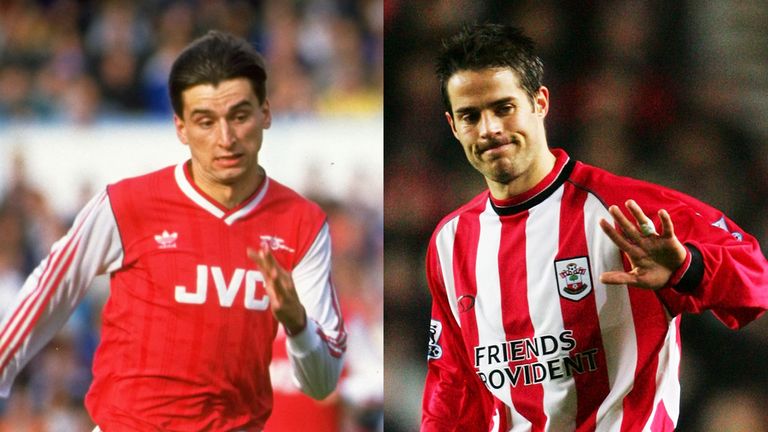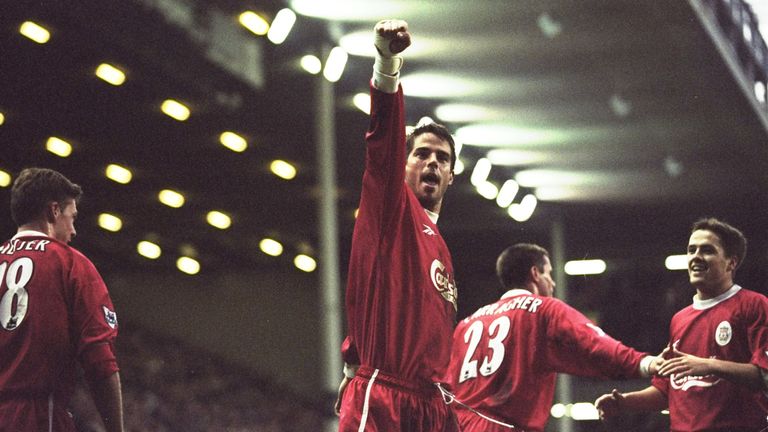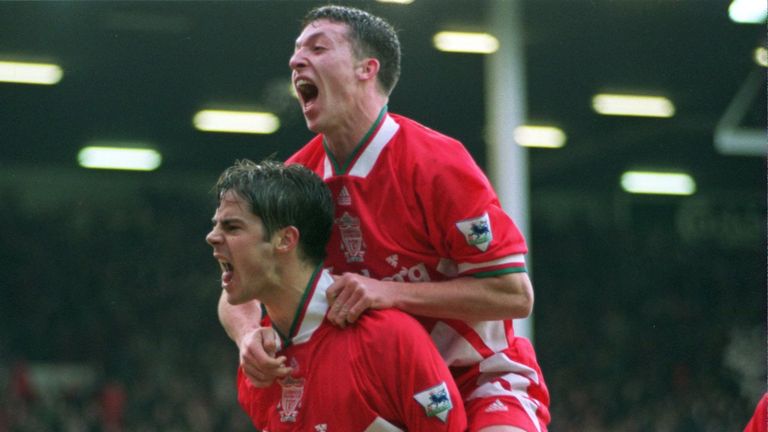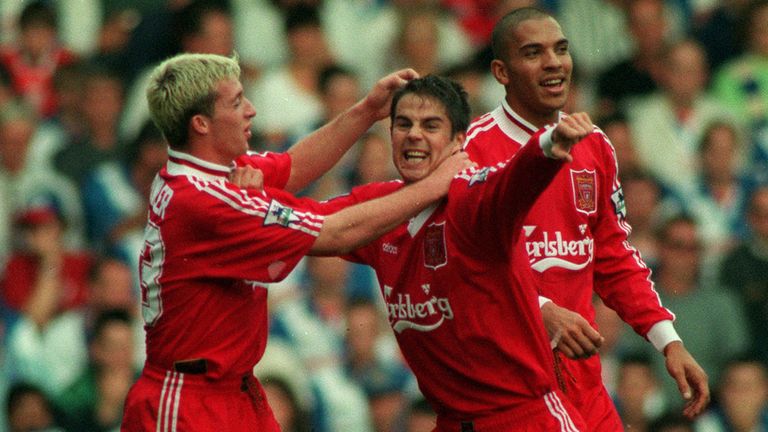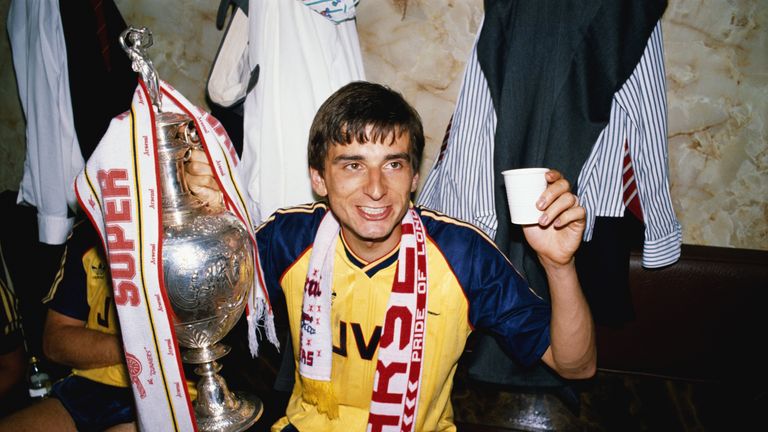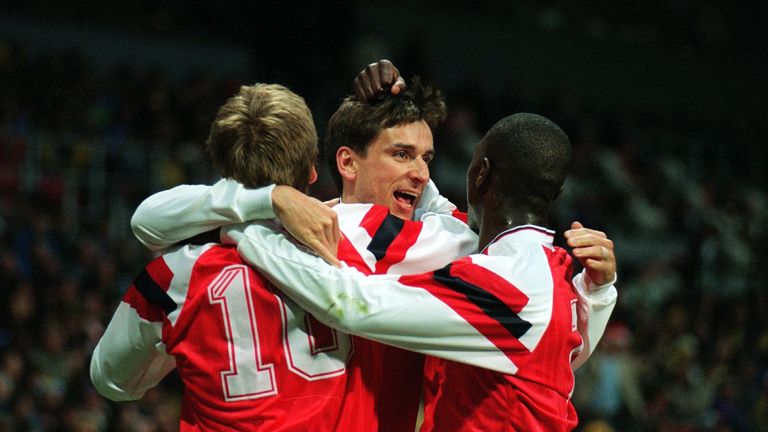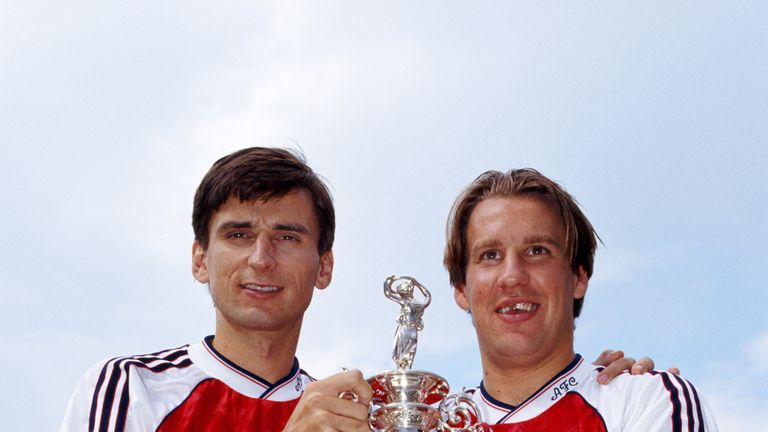Off Script | The mental toll of early retirement, with Jamie Redknapp and Alan Smith
Redknapp: "Being told I would never play football again… I can’t lie, I cried my eyes out, because it was heartbreaking"
Thursday 16 January 2020 07:29, UK
In a revealing episode of Off Script, both Jamie Redknapp and Alan Smith open up on the psychological impact of early retirement from football, and their advice for younger players today.
Redknapp, who retired from the game at 31, was blighted with injury issues throughout his career, going through over a dozen surgery procedures, while Smith retired at 32 after suffering a knee injury while playing for Arsenal.
Both had successful careers - Redknapp played 18 times for England, and was at Liverpool for nearly 12 years, while Smith scored over 200 career goals and won five major trophies at Arsenal - but this didn't reduce the anguish both players suffered upon retirement.
Here, Redknapp and Smith recount the moments they knew it was time to retire...
Redknapp: I cried my eyes out
Redknapp, then at Southampton, was forced to retire in 2005, and recalls his rollercoaster of emotions having just watching Liverpool win the Champions League against AC Milan.
"It's a painful part of the game, and it's certainly something I had to deal with. It's never easy. I was pretty good as a young player, and didn't have many injuries. But I ended up having 12 or 13 knee operations, bone on bone, meniscus taken out, and sometimes you look back and think: 'If things had gone a bit differently, or if I'd played today with the technology they have, would I have managed the injuries differently?'
"I was around 27 when I had surgery at Liverpool - I was bone on bone on my knee - I had surgery in Sheffield, which didn't work, and I ended up going to America to see Dr Richard Steadman, the No 1 knee surgeon at the time and an amazing guy. He gave me a couple of extra years in my career, but I couldn't play to the level I wanted.
"It was difficult playing against players who I felt weren't as good as me, but all of a sudden they are running past me. I could only start to train on the Thursday because I was managing the injury just to get through it.
"I remember Dr Steadman coming into the room in Colorado - it was that morning that Liverpool won the Champions League. The mixed emotions I had from the team I supported winning the Champions League, to being told I would never play football again… I can't lie, I cried my eyes out, because it was heartbreaking.
"But these things happen and you think about what's next, and getting into the media with Sky has just been amazing for me."
Redknapp: I played after 10 days... it was complete negligence
Redknapp recalls a time where he was desperate to return to action too quickly following an injury in his teenage years, and how the culmination of injuries spelled the end for him eventually...
"When I was 18 or 19, in one of Graeme Souness' last games as manager against Bristol City, someone threw the ball to me, I side-footed it back to him and I felt something go in my knee. When I sat down in the dressing room, my knee locked, my meniscus was torn.
"We were losing 1-0 at home, Souness was the angriest man on the planet, he's giving a team talk and slaughtering all of us, and now I have to tell the team doctor and Souness that I can't play any more. I had surgery the following day, and I played 10 days later against Southampton. It was complete negligence from everyone's point of view. I should have waited three or four months. I had no cushion on my knee, but I ended up playing after 10 days, and the damage it did was irreparable.
"I would also always get injured playing for England. I think I tore my hamstring and broke my ankle twice playing for England, and I think it's because I used to get so nervous. I was so anxious to do well for England.
"I would never sleep before England games - I just wanted to do so well - and it can't be a coincidence that I picked up the injuries in those games. I felt the expectation so much more playing for England. I felt more relaxed playing for Liverpool.
"I'd go as far as saying when they did the MRI for my medical coming to Tottenham, it couldn't have been my knee! How I passed that medical I don't know! I got on well with the people, so that might be well! I couldn't play to the level I wanted there, but it wasn't through lack of trying. When you can't train until a Thursday, it is difficult.
"I don't know if players do it when they're injured now, but I tried to watch good games I was in, or good goals I scored, just to build that confidence, to make sure you realise, that when you can come back, you can be that player again."
Redknapp: People question my integrity, that's the hardest bit
Redknapp says that although questions of his integrity are tough to deal with, he feels fortunate to have had such a career in the game, and outside of the game since...
"People question you, saying: 'He's always injured.' That's the hardest bit, because it's questioning your integrity. Especially if it's someone who loved football like I did, it was so difficult to take at times. You get labelled injury-prone.
"There are some times when I look back at it - I had two broken ankles and loads of knee operations - I was very unfortunate. But I have also been so lucky. Football has been so good to me, it has given me the platform to do what I do now, and all of the shows and bits and pieces I do. I'm incredibly proud of that.
"I retired at 31, but I know a lot of great players who retired at 21 and didn't have the chance to play for their country, and never got to captain Liverpool, captain Tottenham. I'm so lucky. I don't look back and think: 'Pity me'. I'm an incredibly lucky guy. I learned a lot from it, and it allowed me to develop as a broadcaster."
Smith: Sitting at home, that's when it hit me for six
Smith, whose injury issues came later in his career than Redknapp's, recalls the moment he was told he would have to retire from professional football, and how he instantly felt like an outsider at Arsenal...
"When the big one came, it came as a big shock. We were playing Millwall in the third round of the FA Cup at the New Den, in January 1995, and I had the ball down at the corner flag, there was no challenge on me, and I tore my cartilage.
"A torn cartilage shouldn't be a really big thing, so I came off, organised to have the operation, a little snip, but when they were in there they noticed some bone damage at the top and bottom of the knee joint. They tried to stimulate growth with hot rods, as they did then, and I think the technique has got better since.
"So they went in again, did another little snip. In-between that period I tried to get fit again, and I'll never forget running around the track at Highbury, trying to get into a sprint, and I could feel the fluid on my knee. I couldn't bend it properly, and I knew it wasn't right. I remember going up to see Ken Frier, our managing director at Arsenal, just to see what the situation would be financially as much as anything else.
"I was 32, faced with the prospect of losing my salary as a professional footballer, and I was worried. As much reassurance as our physio Gary Lewin gave me, saying: 'You'll be OK smudge, you'll be OK', I knew I wasn't right.
"I came back from a pre-season trip to China, which I asked to go on as a bit of a social secretary, to go with the lads I've done so much with. When I got an appointment with the surgeon, John King, and I'll never forget him holding the scans up to the light, explaining why I had to finish. It was just a devastating blow. Even when it's in the back of your mind beforehand, when the surgeon says: 'That's it', it's just a devastating blow.
"My wife waited in the car, and she could tell the news when she saw the look on my face. As well as the heartbreak of knowing you're not going to play football any more, I had a young family, two girls, and I was wondering how I was going to look after them and provide for them. We got paid more than the average person, but nothing like now, where you can sit back.
"Football had been my life since I was a toddler, so for that to suddenly come to an end, it was a lot to take. The worst part was the first day of the season, against Middlesbrough at Highbury, it was Dennis Bergkamp's debut. I remember being sat at home watching that game, seeing my team-mates running out, fit and tanned, and looking forward to the new season. You're sat at home, and that's when it really hits you for six. They're there, I am here. I am outside of that circle.
"When I went to the training ground after my news, I actually saw Dennis Bergkamp and shook hands with him. But you don't want to hang about, you immediately feel like an outsider. They've got one objective - impress the new boss Bruce Rioch - and I was just thinking of other things. You can't wait to get out really, it was awkward saying goodbye, and you drive away towards the next chapter of your life."
Smith: Plan for the worst, it can end fast
Smith got back on his feet quickly through the media, and says both younger and older current professionals should always plan for the worst, and think about their careers outside of the game...
"I applied to the PFA for a grant to do a feature-writing course. I had always had it in my mind to write about football. The writing then started pretty quickly; I did an Arsenal column for a north London newspaper, and then a year later I started for the Daily Telegraph. I got my head down and tried to do the best I could, and tried not to look back too much.
"I tried to think about a marvellous career, playing for England, which is every boys' dream. I had to try and concentrate on the positives. It's just finding something to do with the rest of your life, because there's a long time left. That's what you'll hear all ex-footballers say, and you don't really appreciate how long is left when you are playing.
"I'd say to the younger kids, who are in the academy coming through, just plan for life without football. As much as you want to do it, as much as you think you're capable, plan for the worst-case scenario, and concentrate on your studies. Don't just give it lip service.
"And for somebody coming at the end of your time, think about what you're equipped to do. It is difficult, because so many footballers have come into the game very early, they haven't stayed on at school, and it's been their life, not knowing any different."

